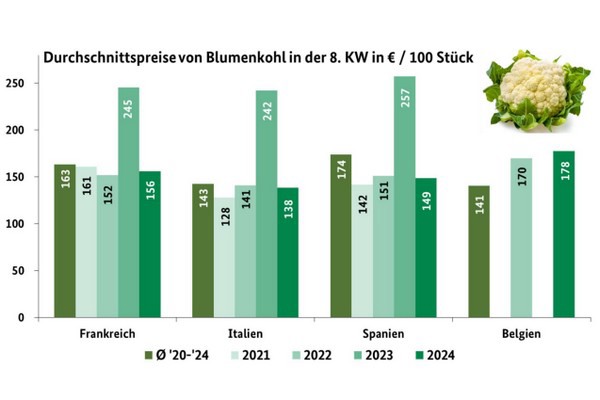French and Italian cauliflower offerings formed the basis of the assortment. Spanish deliveries supplemented the scene, while Belgian ones appeared to a lesser extent exclusively in Cologne. Spanish products were notably absent in Hamburg. However, according to BLE, the availability was sufficient to meet the demand. In some places, storage capabilities had improved, yet in some markets, interest stagnated due to the high temperatures.

Quality-wise, there was particularly nothing to complain about in Berlin; Munich also reported instances of Italian and French batches appearing somewhat wilted. The prices developed differently, but on the whole, they declined, even though occasional price increases were observed here and there. The falling evaluations, however, had positive effects on demand. In Frankfurt, the lighter head weights in the cost-effective 8-pack preparation gained market shares.
Apples
Markets unanimously reported calm, unexcited, and solid business. The assortment had not changed significantly, and the interest could be satisfied without difficulty. Merchants rarely had reason to modify their previous calls.
Pears
South African imports dominated the scene; their presence had intensified compared to the previous week. Conversely, the importance of European batches continuously declined: Italian, Dutch, Belgian, and also German lots visibly lost relevance.
Grapes
Deliveries from South Africa dominated the scene, followed by shipments from Namibia and Peru in terms of quantity. The supply was sufficient to satisfy the calm demand. In terms of pricing, not much happened.
Oranges
Spanish imports prevailed: For oranges, Navel varieties were particularly available, especially Lane Late and Navelate. However, Navelina was still sufficiently accessible. Imports from Egypt had increased: Valencia Late and Salustiana, however, could not consistently convince in terms of quality.
Small citrus
The advanced campaign could easily be read from the reduced storage capabilities: Spanish, Israeli, Turkish, Moroccan, Egyptian, and Italian offerings were available, but these could not always be sold entirely.
Lemons
Spanish deliveries dominated, followed by Turkish in terms of importance. Additionally, Egyptian, Italian, and Greek products could still be accessed on occasion. Overall, marketing proceeded calmly.
Bananas
Supply and demand were generally well balanced. Therefore, distributors rarely had reason to modify their previous prices. Overall, business was quite calm.
Lettuce
Lettuce came from Belgium and Italy, with small quantities from domestic and French sources completing this segment. For iceberg lettuce, Spanish products were exclusively available. Mixed salads were delivered from France and Italy. The small assortments of lamb's lettuce and endives were gradually coming to an end.
Cucumbers
Deliveries from Belgium and the Netherlands did not expand further for the time being, even though the provision of Spanish batches continued to decrease slowly. In Frankfurt, very cost-effective Moroccan offerings and in Munich and Berlin Greek offerings supplemented the range.
Tomatoes
Again this week, a very broad range of products was available on the markets. The winter cultivation country Spain dominated in terms of variety, quantity, and organoleptic properties. Clusters from the same prevailed; Belgium, the Netherlands, and Turkey supplemented this line.
Bell peppers
Spanish peppers dominated the calm market scene in all colors before Turkish and, only in Frankfurt, also Moroccan ones. Red and especially yellow products did not always find the desired appeal and lost value over the week.
Source: BLE
